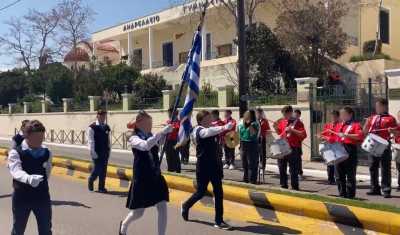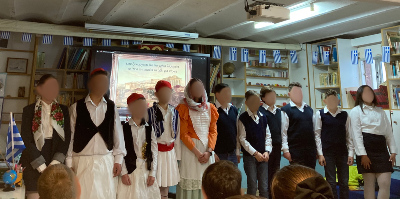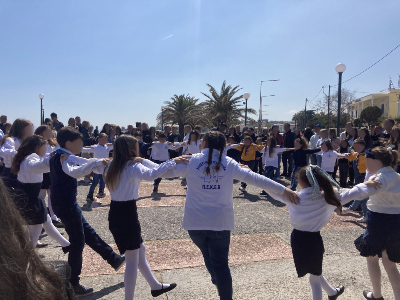Greek flags decorate houses and gardens, students march through the streets under the guidance of their physical education teachers, children practise traditional songs and dances: In Greece, the days leading up to 25 March are packed with preparations for a big celebration. Parades and dances take place every year on this special date, the Greek Independence Day. During my time as an ESC volunteer at the 2nd primary school of Vrontados, I had the chance to experience the preparations and festivities at first hand and to learn about the fascinating historical and religious background of the 25th of March.

The first time I learned about the parade in Vrontados was when I saw the older classes of the primary school marching with their PE teacher. They had been practising for quite some time to perform the choreography of the march synchronously. It was great to see them practising and getting better every time. The 2nd class, where I spend most of my volunteering time, also prepared for the festive day. They discussed in school where they would spend this day and what festivities they would attend. On Thursday the 23rd their teacher took some time from the normal grammar lesson to explain the meaning of the celebrations to the children:
Since 1838, the 25th of March has been celebrated as Greek Independence Day. It marks the beginning of the Greek Revolution in 1821. For four centuries, Greece had been under Ottoman rule. At the beginning of the 19th century, a secret organisation called Filiki Eteria was founded in Odessa with the aim of liberating Greece from Ottoman rule. They found more and more supporters who wanted to join them in a revolution against the Ottoman Empire. In 1821, the revolution began. The date chosen by the revolutionaries was the highly symbolic 25th of March. This date was already important, but in a religious way. It is the date of the Annunciation to the Theotokos: The Archangel Gabriel announced to the Virgin Mary that she was pregnant with Jesus Christ, the Divine Child. It symbolises God’s entry into the world to save the humans. It is therefore celebrated as a day of hope and joy. Although the revolutionaries’ uprising needed to start earlier, it was still successful. In the London Protocol in 1830, Greece was finally recognised as independent after nine years.
In Chios, the revolution didn’t start until 1822, when revolutionaries from Samos launched attacks against the Turks. The Ottoman Empire reacted with a terrible massacre in which thousands of inhabitants were expelled, murdered or enslaved. Chios remained under Ottoman rule until 1912, when it joined independent Greece after the First Balkan War. The cruel events of the war – and particularly the massacre of Chios – shocked people all over Europe. Many know the famous painting The Massacre of Chios by Eugène Delacroix or poems by Lord Byron, to name but a few examples of how Europeans expressed their sympathy for the Greek people.

These historical events would be presented to us again the next day in a very creative and informative way. The whole school took a seat in the library where the 6th grade had prepared everything for an interesting theatre play. Dressed in creative historical costumes, they not only played their roles but also sang and danced together.
Afterwards, the 2nd grade painted an illustration depicting the Greek flag and a boy in traditional clothing.

Finally, the day of the celebration itself arrived. On Saturday the 25th of March we went to the square in front of the statue of Afanis Naftis in Vrontados to watch the parade.
All the different schools and organisations, such as the scouts, were marching, accompanied by the music of the students of the school of music of Vrontados. They held Greek flags and wore uniforms or traditional dresses and suits. They then gathered in the square and performed traditional dances.
Not wanting to miss the military parade in Chios town, we took a taxi to the square. It was impressive to see all the different organisations marching – and finally, of course, the military.
In short, the preparations and celebrations of the 25 March have taught me a lot. They remind us all that the human right to freedom is something precious that previous generations had to fight for. The motto of the Greek revolution, “freedom or death”, shows us how difficult the struggle was and how many sacrifices were made. I am grateful to have experienced this great cultural event.




